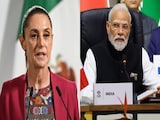India strode prominently on the international stage in 2023. It chaired the G20 summit, as also the SCO summit (virtually). It attended the BRICS summit in South Africa. India was invited to the G7 summit in Japan where it also participated in the Quad meet. In organising a Voice of the Global South summit just before G20, India increased the diplomatic heft of its presidency.
At the bilateral level, US President Joe Biden, as a special gesture, invited Prime Minister Narendra Modi to the US on a state visit, which included an address to the US Congress. This wooing of India carried a significant political message about the growing strategic underpinnings of India-US ties, despite differences over our relations with Russia, the Ukraine conflict, our refusal to impose sanctions on Moscow, and the campaign in US think tanks, media, academia, and human rights organisations against "democracy backsliding" in India. US accusations of India's alleged involvement in the Pannun affair has been a troubling development.
French President Emmanuel Macron invited Modi to the Bastille Day on July 14 as the Chief Guest, a gesture of high regard for the Indian Prime Minister personally as well as a signal of the growing strategic understandings between France and India.
All these developments had India's steady economic rise, its growing technological and human capacities, strong, purposeful and ambitious leadership, diplomatic dynamism, and an independent foreign policy as the backdrop.
The success of India's G20 presidency was a tour de force in some ways. Without a Leaders' Declaration India would have suffered a serious diplomatic setback because of the massive political investment Modi had personally made in making the event emblematic of India's domestic and international ambitions.
The absence of a declaration would have also put the G20 in jeopardy as a platform, and this on India's watch would have been a blow to its rising profile. The opposition in India would have exploited any failure in the run up to the national elections in 2024. India, however, was able to finalise a fully agreed Leader's Declaration without caveats by any country.
That this proved possible despite the collapse of G7 ties with Russia over the Ukraine conflict, the draconian sanctions on Russia by the West that inflicted serious economic costs on the Global South by way of food, fertiliser shortages and disruptions in energy flows, was remarkable. The final declaration carries a substantial paragraph on Ukraine, which met the diplomatic needs of both the G7 and Russia backed by China.
The openly adversarial relationship between the US and China has disrupted international politics as well as existing economic and technology frameworks, led to moves to restructure global supply chains and raised the spectre of a conflict in the western Pacific.
China is now openly challenging US power. Through the Belt and Road Initiative (BRI), it has knit relations with all corners of the globe in trade, control of vital raw materials and infrastructure development.
The West-built international order is being eroded, with Russia and China seeking to actively promote a multi-polar order. The Global South as well as some non-western countries hitherto politically and militarily dependent on the US are now pursuing hedging strategies and striving to balance their external ties by reaching out to China, even to the point of seeking its good offices to bring about reconciliation between regional adversaries, in, for instance, West Asia.
All this has consequences for multilateralism and collectively addressing pressing issues of climate change and issues of financial and technology transfers to developing countries and energy transition. (India stood its ground on its core interests at the Cop 28 summit at Dubai in November/December 2023). The indebtedness of developing countries, the accelerated implementation of Sustainable Development Goals needs genuine global cooperation, which will be impeded by the fractures in the international system. On top of this, India and China are locked in a military confrontation in the Himalayas as well as in the east.
It is in this broad international context that India's G20 success in developing a consensus on all vital issues facing the international community and bridging the divides should be assessed. India has emerged as a consensus-builder and a proponent of dialogue and diplomacy to resolve differences. It has credibility with both the North and the South, and to some degree the West and East (China apart).
India has capitalised on its policy of engaging all, even those who are mutual adversaries. Its membership of BRICS and SCO while as it is a member of the Quad supports the Indo-Pacific concept. India has grown visibly closer to the US even in the defence domain, which has given the country more room to manoeuvre on the international stage, and made it a valued partner to those who want to preserve the present "international order" as also those who want to reform it or even challenge it.
India is projecting itself as an upholder of the international order, albeit a reformed and a more democratic and equitable one. It sees building closer ties with the US as necessary for trade and access to capital. Cooperation in advanced technologies with the US is considered critical for India's economic growth and competitiveness. India wants to be a beneficiary of the shift in global supply chains hitherto concentrated in one geography. At the same time, it seeks a greater voice and role for itself and for the developing world in international governance.
The Voice of the Global South summit in January 2023 was intended to shift the agenda of the G20 from G 7 priorities to those of the developing world, such as managing global debt vulnerabilities, food and energy security, eliminating hunger, climate change financing, affordable, just and sustainable green development, focus on SDGs, reforming international financial institutions, and so on. Promoting the G20 membership of the African Union was part of this strategy. India convened the second summit of the Voice of the Global South in November 2023 to maintain the momentum.
India's membership of BRICS meets the goal of "international re-balancing", though the expansion process is not based on any clear criteria and is being thrust forward by China and Russia as part of their push for "multipolarity", which is a code word for countering the US dominance of the global system.
The SCO summit India chaired in July, although a platform for cooperation in Central Asia that excludes the West, has, for New Delhi, a logic beyond that. India as an Asian power cannot allow itself to be excluded from the Asian landmass and must remain a balancing factor in the power equations in this region, which are moving in China's favour.
The New Delhi SCO Declaration emphasised greater effectiveness of global institutions; a more representative, democratic, just and multipolar world order based on international law; multilateralism; equal, joint, indivisible, comprehensive and sustainable security; and cultural and civilizational diversity, with a central coordinating role of the UN. It stressed that unilateral application of economic sanctions other than those approved by the UN Security Council was incompatible with the principles of international law and had a negative impact on the third world countries and international economic relations. All this reflects dissatisfaction with the West dominated global system and the need for change and reforms.
With President Biden unable to attend India's Republic Day in 2024, and the consequent postponement of the Quad summit, President Macron's willingness to step in shows both the personal chemistry between him and Modi and the deepening strategic ties between the two countries. This was already reflected in Macron's invite to Modi to be chief guest at Bastille Day on July 14, when the two sides laid the foundations of a strategic relationship spanning the next 25 years by adopting the "Horizon 2047 Roadmap on the 25th Anniversary of the Indo-French Strategic Partnership: towards a century of French-Indian relations". India and France adopted a new Indo-Pacific Roadmap during Modi's visit, which includes extending their cooperation to the Pacific.
In May 2023, Prime Minister Modi, invited to the G7 summit in Japan, also attended the Quad summit. In his opening statement, Modi spelt out the importance India now attaches to the Quad, both on the security and economic fronts. He spoke of the Quad establishing itself as an important platform for ensuring peace, stability and prosperity in the Indo-Pacific, recognised that the security and success of the Indo-Pacific was important also to the world. Modi reiterated that India now saw Quad as a "global good".
At Hiroshima, India joined the vigorous criticism of China's policies in the western Pacific that adversely affect India's interests too. India-China ties remain frozen at the political level. China has not appointed an ambassador to India since October 2022. President Xi Jinping did not attend the G20 summit in Delhi. The meeting of India's Foreign Minister with his Chinese counterpart in Delhi during the SCO Foreign Ministers' meeting produced no change in positions. China is making it clear that it will not make any concessions on the Line of Actual Control (LAC), and that India must accept the new realities on the ground. India, on the other hand, has reiterated several times in 2023 that for ties to be normal, the situation on the border has to become normal.
External Affairs Minister Jaishankar's five-day visit to Russia in late December was politically necessary in the absence, again, last year of an India-Russia summit. Any feeling that the relationship was losing its vitality needed countering. Jaishankar's visit sent a clear political message - India will continue to nurture its ties with Russia, undeterred by pressures by the West.
Jaishankar was received by Putin who does not usually meet Foreign Ministers. Putin has in fact been publicly praising Modi for refusing to be intimidated and for pursuing India's national interest despite pressures. Jaishankar delivered a personal message from Modi to Putin, who, during the meeting, invited his "friend Modi" to visit Russia in 2024, a prospective Jaishankar endorsed. Jaishankar noted that after talks with Sergey Lavrov, "what clearly came out was that India-Russia relations remain very steady, remain very strong, they are based on our strategic convergence, on our geopolitical interests, and because they are mutually beneficial".
All in all, India steps into 2024 with greater self-confidence and a higher international profile.
(Kanwal Sibal was Foreign Secretary and Ambassador to Turkey, Egypt, France, and Russia, and Deputy Chief Of Mission in Washington.)
Disclaimer: These are the personal opinions of the author.















